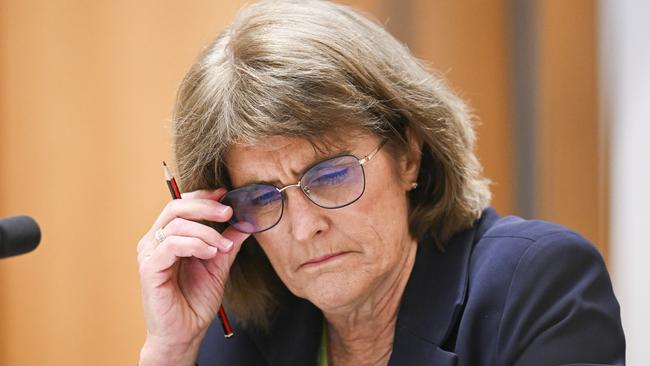
She acquits herself very well when handling public presentations, including appearing before Senate Estimates as well as other parliamentary committees, and conducting media conferences after the bank’s periodic cash rate decisions. These conferences have been an innovation under her watch, but sanctioned by the Treasurer Jim Chalmers.
She cheerfully accepts many questions from the assembled throng of economic journalists. But the timing of the media conferences means that the immediate economic narrative is set by Bullock rather than Chalmers, something that might just irk him from time to time.
Bullock is nothing if not diplomatic, but it is clear from her answers, as well as documentation put out by the bank, that there is a very real tension between her and Chalmers. Bullock’s position is relatively straightforward: underlying inflation remains too high, there is not enough spare capacity in the economy; and government spending is working against the cash rate being cut any time soon. The fact that a very large chunk of the gains in the extremely tight labour market is the result of direct or indirect government jobs is a further consideration.
But she is always very careful about what she says. By stating that government spending is not the main game, for example, she is just making the obvious point that consumption is the largest component of the GDP. Changes to government spending are another factor altogether.
Chalmers’ view is that the government’s measures to reduce the cost-of-living have led to the headline rate of inflation being within the band of 2 to 3 per cent per year and this should count for something in the bank’s deliberations. He sees soft economic conditions, particularly in the private sector, and regards this as a significant factor the bank should be considering.
It might all seem friendly enough, but there are very real tensions between these two economic leaders. This is made worse by the fact that Treasury secretary, Steven Kennedy, sits on the board of the Reserve Bank. As David Pearl, former senior Treasury official, has pointed out: not only is this arrangement almost unique among developed economies, but it is also a fundamental governance error.
The politics of this are plain to see: Chalmers is desperate to see the cash rate reduced before the next election. Only in this way will there be a cut to mortgage rates. Mind you, the Fed in the US cut its official interest rate by 50 basis points not long ago, but this seemed to have little impact on its election result. (Note far fewer Americans are on variable interest rate mortgages, so this would dampen any political effect.)
Bullock will stay firmly on her preordained course – cutting the cash rate only when the bank is certain that the underlying inflation rate is sustainably within the target band.
Unsurprisingly, Bullock was grilled in the Senate Estimates hearings about the implications for the Australian economy of Donald Trump’s victory in the US. While the direct imposition of tariffs on Australian exports to the US would be relatively inconsequential – we export just over $20 billion of goods and services to the US – the indirect effect via China could be very significant.
China is Australia’s largest trading partner by far, with some $200bn of exports. Were the Chinese economy to be damaged because of super-sized tariffs imposed by the US, this would have a negative ripple impact on us. More generally, a global trade war would harm the Australian economy.
There is also the possibility that interest rates may stay higher for longer here as the US government further ramps up its spending and its budget deficit rises even further. The flip side is that the growth of the US economy may accelerate and that would benefit global growth, at least for a while. It will be a case of watch this space.







Michele Bullock has had a long career at the Reserve Bank. Her elevation to the position of governor was somewhat unexpected given that she hadn’t worked in the interest rate setting area. Having said this, she has grown into the job and seems completely capable of handling the pressures of the role.